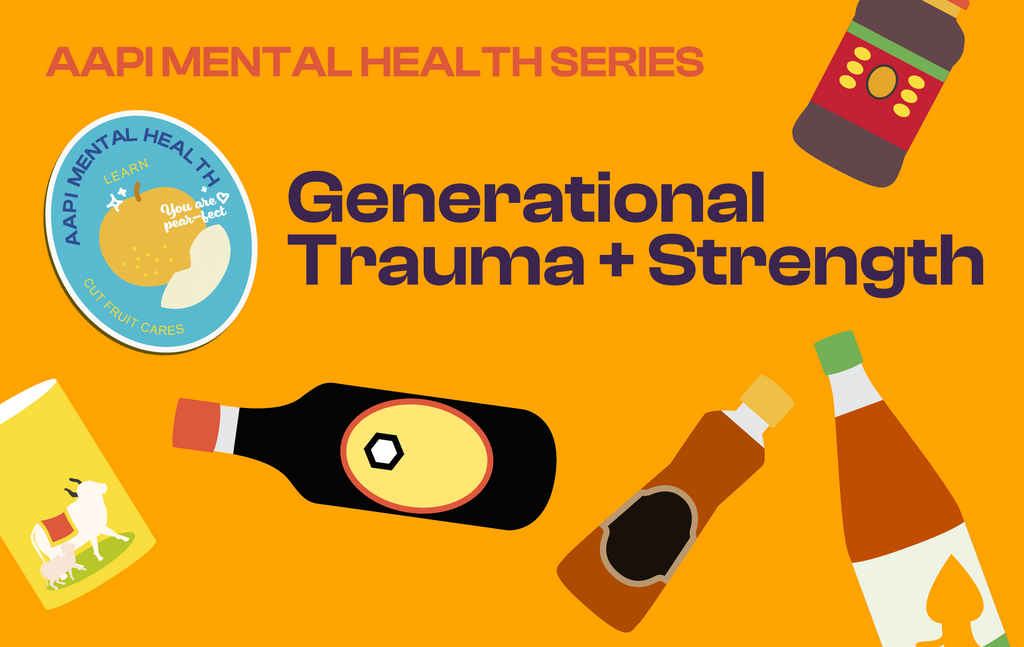Generational Trauma & Strength

In honor of AAPI Heritage Month and Mental Health Awareness Month, our intern Amanda will be addressing AAPI mental health topics every Monday. This week, our intern and clinical mental health counseling student Amanda will be diving into generational trauma and strength. If you like this series, you can show your support to Amanda here.
Trauma is often characterized as an individual struggle. We see this in individual diagnoses of post-traumatic stress disorder (PTSD) or acts of abuse or harassment from one person to another. While trauma can certainly affect us as individuals, it is not always the whole picture. Generational trauma describes trauma & trauma responses that have been passed down from generation to generation.
You notice that the collection of expired sauces and spices your parent keeps in the kitchen continues to grow. You ask your parent, “Why don’t we keep some of this and toss out what's expired?” They become angry, yelling, “It’s wasteful to throw away perfectly good food! You never know when you’re going to need this!”
While it may seem like an overreaction, consider their life: Did they grow up in poverty? Have they experienced periods of time when they did not have what they needed to live well? Taking a big-picture look at their life may reveal some understandable reasons for their reaction.

Often, the effects of trauma will be passed down through behaviors, feelings, memories, and language. Trauma that can affect multiple generations include:
- poverty
- emotional, physical, or sexual abuse
- death in the family
- stress from immigration
- ongoing, daily experiences of discrimination and racism
- colonization and displacement from Native land (such as that of Native Hawaiians by the United States)
- post-colonization instability (such as the partition of India and Pakistan)
- genocide (such as that of the Cham by the Khmer Rouge)
- state sanctioned violence (such as the internment of Japanese Americans)
Recognizing the sheer violence, brutality, and trauma we and our ancestors have experienced or are currently experiencing can feel overwhelming. Feelings of hopelessness, grief, despair, numbness, and rage are valid. Physical sensations, like a tightness in the chest, heaviness in the shoulders, or nausea in the stomach are natural. We can take time to sit with these feelings and observe how they affect our emotions, body, and community.
In Asian and Pacific Islander diaspora communities, we may see generational trauma appear as:
- forced assimilation and/or invisibility
- loss of language between generations
- hypervigilance, or always preparing for disaster or crisis
- accumulating an excessive amount of possessions/resources
- unaddressed mental health issues
- belief in the “Model Minority” myth, or overwork and the pressure to always appear successful
How can we as AAPI break these cycles of generational trauma while also building upon generational strengths? After all, our ancestors did not only pass down trauma. Their adaptive and resourceful coping skills served as strengths that allowed them to survive difficult experiences. Their skills live on in us.
We do not have to heal this generational trauma alone. Our generational strengths make us:
- Resourceful. We reuse takeout containers and reinvent traditional dishes with ingredients that are available to us.
- Resilient. Our cultures have values around overcoming difficulty, such as 我慢 (Japanese: gaman) or katatagan (Tagalog).
- Proud. We preserve our cultural practices despite pressures to assimilate.
We can draw from the wisdom of our elders, asking them to share their stories and perspectives to pass on to generations to come. We can acknowledge where we can grow, taking what our elders have learned and shaping it into something that helps us thrive, not just survive.
We can pass the baton to future generations, creating Asian and Pacific Islander communities where we no longer have to be resilient, but still choose to be–because it is a way for us to carry on our ancestors’ legacy.
Affirmations for AAPI:
- The work of breaking generational cycles may feel lonely, but know that you are not alone. You are held by community.
- Generational healing takes time. Incremental, imperfect change is enough.
- Your courage to be who you are will be felt for generations to come.
- You do not have to have children to heal generational trauma.
References
